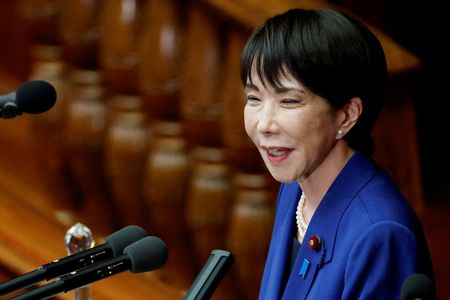By Yuka Obayashi and Katya Golubkova
TOKYO (Reuters) -Marubeni plans to follow the guidance of the Japanese government regarding its involvement in Russia’s Sakhalin-1 oil project after the U.S. government sanctioned the project’s key shareholder Rosneft, its CEO said on Tuesday.
Last month, the U.S. hit Russia’s major oil companies Rosneft and Lukoil with sanctions, the most recent step to force the Kremlin to end the war in Ukraine. The U.S. will allow operations with Rosneft and Lukoil to wind down until November 21.
Marubeni is a shareholder with Japan’s SODECO consortium, a Sakhalin-1 co-owner. Other Japanese stakeholders in SODECO include Itochu, Japan Petroleum Exploration, Inpex and the industry ministry.
“I am very concerned about the recent changes,” Marubeni CEO Masayuki Omoto told a briefing. “I will firmly ally with the Japan government’s response (to the latest sanctions).”
ExxonMobil, which used to own a 30% stake in Sakhalin-1 and had led the project since it started in the 1990s, took an impairment charge of $4.6 billion to exit its Russian businesses after Moscow sent troops into Ukraine in February 2022.
In October that year, the Kremlin appointed Rosneft subsidiary Sakhalinmorneftegaz-shelf as the new operator of Sakhalin-1. Last year, Russian President Vladimir Putin signed a decree extending the sale period for the unclaimed Exxon stake in Sakhalin-1 until 2026.
Before Exxon’s exit, Rosneft and India’s ONGC Videsh owned a 20% in the project each and the SODECO consortium controlled a 30% stake.
PROFIT UP
Omoto made the comments during Marubeni’s earnings briefing. The company reported a 28% rise in its first-half net profit to 305.5 billion yen ($2 billion), helped by a stronger performance in its financial, real estate and food businesses.
The company, in which Berkshire Hathaway owns a stake, kept its annual net profit forecast unchanged at 510 billion yen, including a 30 billion yen cushion for contingencies.
Marubeni plans total asset divestments of 250 billion yen this fiscal year, including in its natural resources segment, more than double the already achieved 96.2 billion yen of divestments so far.
($1 = 150.7800 yen)
(Reporting by Katya Golubkova and Yuka Obayashi; Editing by Christopher Cushing, Subhranshu Sahu and Christian Schmollinger)











